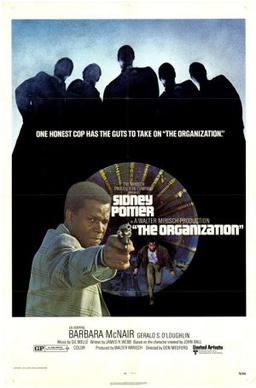For so many reasons, 1967's In the Heat of the Night was a key movie that helped mark the change of the portrayal of race on-screen. It was a groundbreaking movie, one that's noteworthy for the working relationship between two cops, one black, Sidney Poitier, and one white, Rod Steiger. While that film is fondly remembered though, Poitier returned with the same character in two sequels, 1970s's They Call Me Mister Tibbs and 1971's The Organization.
At a heavily guarded business, a murder has taken place, but there is little in the way of evidence pointing to the culprits, leaving the police and investigating officer Virgil Tibbs (Poitier) grasping at straws. As the investigation develops though, Tibbs is contacted by an urban revolutionary group with some revealing information. They take credit for robbing the business -- a front for a criminal organization -- of $4 million worth of heroin, but nothing about the murder. Tibbs is left to make a difficult decision. Help this group that broke the law (multiple times) even though their intentions were pure, or turn them in to face the law.
My first reaction when I found this movie on TCM's schedule was that Poitier was slumming with these two sequels. I've never seen 'Mister Tibbs' so take that into account here too. These two movies in no way affect the power or effectiveness of 'Night,' but what's the point? Why make two sequels? The original got the message across, and even though Poitier's Virgil Tibbs is one badass character, was there a need for more stories back in his hometown instead of the deep South? Nope, not really. Even more unfortunately, the sequel's script and story just isn't up to par. I'm not a huge fan of sequels to begin with, but if the effort is there I'll at least go along with it for the ride. Moral of the story is simple; cool character does not equal cool movie.
Thanks to Poitier and the San Francisco backdrop for the story, the movie isn't a complete waste of time. The script simply doesn't give Poitier much to do as the lead character. He gets deeper and deeper into this case with no easy way out, but there's nowhere to go other than straight down. We get some background with his wife, Valerie (Barbara McNair), and son (George Spell), even some oddly toned scenes where they talk about the birds and the bees. It's far from Poitier's best work, but even a mediocre performance from him is still worthwhile. There's not much else worthwhile in the character department though, leaving Poitier to do all the heavy lifting.
The sinister aspect of "THE ORGANIZATION" is wasted here because the story never picks a route to take. Instead, it bounces all over the place. The urban revolutionaries (including Raul Julia, Ron O'Neal, Billy Green Bush, Lani Miyazaki among others) could have been given their own movie, but instead they are background players here -- a means to an end -- and they never amount to anything more than that. The Organization and all their henchmen are nameless faces (intimidating if nothing else), and the bosses (Fred Beir and John Lasell) have little personality. This criminal organization is given no background, no history, no truly sinister nature other than what we see, but there's no reasoning or motive. So Poitier's Tibbs wants to take them down, but what's the point?
On the positive, look for 1970s eye candy Sheree North as a woman with a possible link to the case and Gerald S. O'Loughlin as a fellow police officer, Lt. Pecora, working with Tibbs on the investigation. Mostly though, the movie on the whole never connects. The story drifts along without much of an end-game in sight so the chases and shootouts don't amount too much. They're there in the story, but when you're not interested in the story to begin with, those sequences lack any energy or much of an interest level. As Bullitt and the Dirty Harry movies proved, San Francisco is a great backdrop for a cop story so the locations stand out, and Poitier is solid, but there's little else.
The Organization <---trailer (1971): **/****


No comments:
Post a Comment